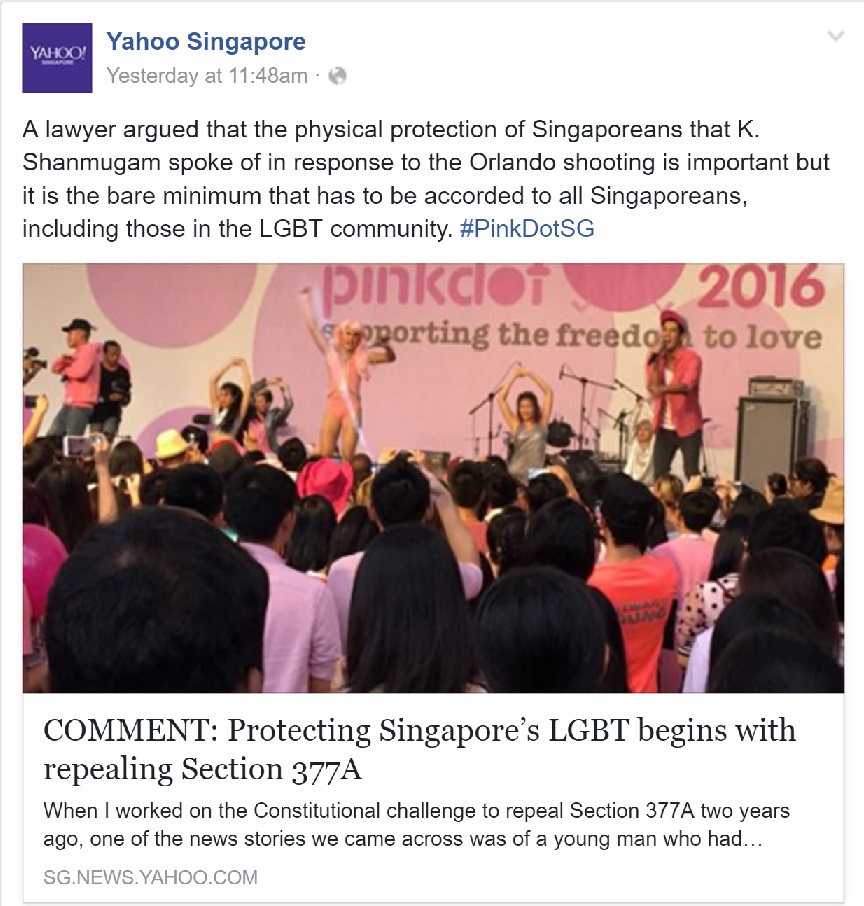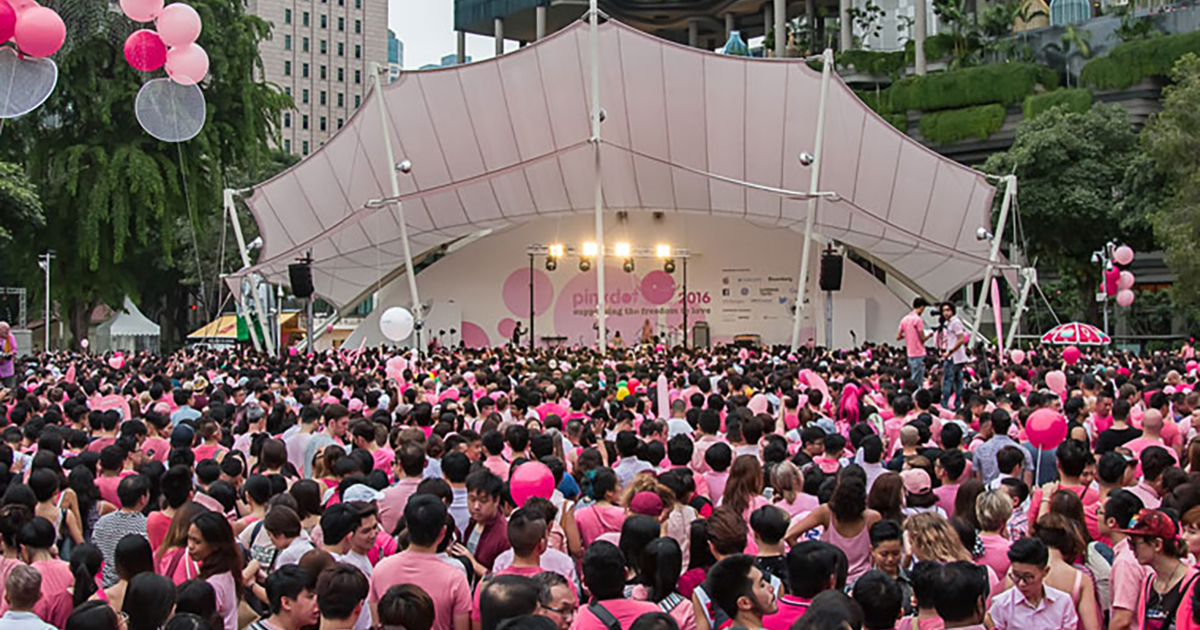When Home Affairs and Law Minister K Shanmugam gave his comments to the media on June 14 on the mass shooting at Orlando, his comments about a community raised some eyebrows:
"The motives of the gunman are not yet clear...But it looks like the gay community has been targeted. This is unacceptable. Violence against any group and any form is not acceptable. Here, the Government will act decisively, if there is threat or violence against anyone or any group.
The Government's duty is to protect everyone. Their race, their religion, their sexual orientation - these are not relevant in terms of the Government’s duty to protect. We have a duty to protect everyone." (our emphasis in bold)
This is because it has been a while since a government leader mentioned anything related to the lesbian, gay, bisexual, and transgender (LGBT) community.
The last time the issue was brought up? 2013.
Prime Minister Lee Hsien Loong was asked about his position on Section 377A of the Penal Code at the Singapore Perspectives conference organised by the Institute of Policy Studies (IPS).
PM Lee told the audience that the status quo will remain, adding that it is really best for Singaporeans to leave things be and agree to disagree on Section 377A.
Sensing an opening from Minister Shanmugam's recent comments, lawyer and The Online Citizen founder Remy Choo argued in a commentary that if "Singapore wants to be serious about protecting the LGBT community, we need to decriminalise the community and repeal S377A."
 Source: Yahoo News
Source: Yahoo News
Choo said that "protecting the LGBT community means creating an environment where sexuality doesn’t have to be hidden for fear of stigma, of blackmail, of stunted career advancements".
He also asked how the LGBT community can be accorded an equal protection of the law guaranteed under Article 12 of the Singapore Constitution if they could be considered criminals.
What is Section 377A?
Section 377A makes it a crime for a man to commit acts of gross indecency with other man, whether in private or public. It carries a jail term of up to two years. The law was enacted in 1938.
Here are three observations why the government is between a rock and a hard place on the repeal of Section 377A
1. The government will not be able to change deeply held beliefs and views by supporting or not supporting the repeal of Section 377A.
In a two-day Parliamentary debate over Section 377A in 2007, PM Lee told the MPs that it is "better to accept the legal untidiness and the ambiguity" because it works.
There are several reasons for keeping the status quo.
First, there will be no happy consensus in the society. If the government tries to force the issue and settle the matter definitively, the government is "never going to reach an agreement within Singapore society".
Second, it will polarise all Singaporeans, even those who are presently willing to live and let live. They will be asked to take sides.
Third, a discussion and debate may not bring people on both sides closer together.
Both camps hold strong views. Those who oppose have deeply held convictions, some religious. Those who propose it are also doing so from deeply felt fundamental principles.
2. Both the conservatives and the LGBT communities need to do more to convince fence-sitting Singaporeans (including the government) why such a debate is again needed in the first place.
Ambassador Bilahari Kausikan noted the rise of "culture wars" in his valedictory public lecture on the relevance of Singapore in a post Cold War:
"The culture wars are upon us. Some part of our population is clearly attracted to western attitudes towards such issues as the death penalty and LGBT rights. Are these Singaporeans typical? I share some – only some, not all – of their attitudes but I don’t think so. Most Singaporeans are much more conservative. In any case, fundamentalist versions of both Islam and Christianity are not absent in Singapore too and have very different attitudes which cannot be ignored whatever we may think of them. These issues are not going to be resolved anytime soon".
Fortunately, the culture wars have not "infected" the whole population yet.
Many Singaporeans are currently not strongly engaged, either for removing 377A or against removing 377A.
What can the conservatives and the LGBT communities do to persuade Singaporeans that they are the moral majority and on the right side of history?
Numbers and the weight of their moral arguments - they can claim that they have the support of Singaporeans. Or they can claim that they are right.
For the conservatives, their rationale is that Singapore is a generally conservative society.
Exactly how large is this group? According to the 2000 Census, Muslims (14.9%), Catholics (4.8%) and Christians (9.8%) form 29.5% of the population.
Morally, they argue that the heterosexual family is the basic building block of the Singapore society that is reinforced by government policies (housing policy for instance). They also say that a heterosexual family is the social norm.
For the LGBT community, they point out to the ever-growing support of the Pink Dot Movement at Hong Lim Park.
Pink Dot grew from 2,500 participants in 2009 to 28,000 participants in 2015, though the interest in the event may have reached saturation level with its lowest growth in 2015. Pink Dot 2016 organisers also declined to declare its 2016 numbers to the media.
Morally, the LGBT community argues against discrimination and fight for the right to be accorded equal rights and protection in the Constitution.
But without clear numbers to convince the average Singaporeans, it is difficult to persuade whether one should be convinced by the arguments from 29.5% of the population or the 28,000 active participants of the LGBT movement.
Importantly, both parties have yet to provide convincing arguments on the consequences for Singapore and Singaporeans following the repeal of 377A.
3. Time will tell: the government is prudent to preach patience and be led by the citizens (for once).
As PM Lee noted in the 2007 debate, it is "better to let the situation evolve gradually" because Singapore is an open society.
Let me use the United States as an example.
American journalist and author E.J. Dionne Jr. noted in his book Souled Out: Reclaiming Faith and Politics After the Religious Right (2008) that an analyst of American public opinion observed that one of the most important determinants of attitudes towards gays and gay marriage is whether someone has a close gay friend of relative.
The most decisive determinant is age, with young Americans far more likely to be comfortable with homosexuals.
One cannot help but wonder whether the conversation surrounding the LGBT issue is not just the repeal of the 377A, but the need for more space and acceptance by other Singaporeans.
This is a battle for the hearts and minds of every Singaporeans, and not just a legal battle to remove an arcane law.
[related_story]
Top photo by Ng Yi Shu
If you like what you read, follow us on Facebook, Instagram, Twitter and Telegram to get the latest updates.
